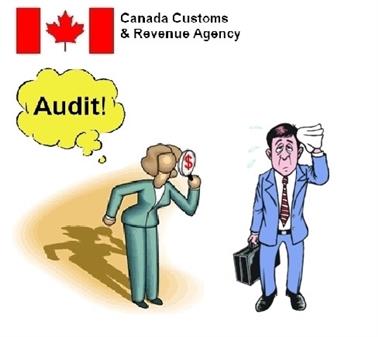
Tax audit causes headache. You’ve filed your taxes and already spent your refund, but Canada Revenue Agency may go back to you, and requests additional information in support of your tax return for the year.
These are 10 factors that will typically trigger a tax audit and you would like to avoid.
1. Errors in your Tax Return
A common and entirely preventable audit trigger is making mistakes on your tax form. Mistakes can include writing your address incorrectly, or making calculation error when you subtract your expenses from your business income, or deducting the principle portion of your mortgage payment from your rental income.
Whether you do your income tax yourself, or you hire a tax specialist, it’s always your responsibility to make sure your tax report is accurate. If you find a mistake after filing, you should file an adjustment rather than having the CRA find the mistake for you.
2. Not Providing Information as Requested
In many cases, the CRA isn’t looking to do a full tax audit, but just requesting additional documentation or information to support your claim. They may ask for receipts for childcare expenses or legal documents for the support payment you paid to your ex-spouse. Failing to provide the requested documents within a reasonable time frame could result in a more comprehensive audit.
3. Living Rich Beyond Your Income
A person who drives a Ferrari and lives in a mansion, but just has $25,000 yearly income would be a prime tax audit candidate.
The CRA may conduct a net worth assessment and you will have to explain where the money came from. Of course, there may be good reasons. Maybe you inherited money; maybe you won the lottery; maybe the money isn’t yours, but belongs to somebody else.
The key to beating the net worth assessment is to document any significant funds you receive, especially when the funds come from outside Canada.
4. Compliance History
If the CRA finds that you have cheated once, there are much more chances that you will hear from them again. On the other hand, if they conduct a random review and you pass without red flags, they will be more likely not to bother you again.
5. Inconsistencies in your tax return from year to year
If there is a significant difference from one year to the next, the CRA may decide to follow-up with an tax audit. Specifically, expenses such as travel and entertainment are ones that CRA will watch. You need to be aware your previous year’s income and expenses and be prepared to substantiate any variance with CRA.
6. Out of the ordinary
Claiming higher than usual expenses is asking for trouble. The CRA may compare tax returns amongst similar businesses in the same industry to make sure whether income and expense are reasonable.
For obvious reasons, the CRA does not publicize what the amounts are that will automatically trigger a review. However, if you are claiming to use your vehicle 95 per cent for business use, we would expect that they will want to see your log book.
7. Mixing your personal and business
For incorporated business owner, the habit of taking monies out of the business regularly to pay living expenses needs to be stopped. To pay yourself, you now need to prepare a T4 slip for yourself, and deduct CPP and income taxes. If you hire your family members and make payment to them, you need to make payroll deductions, and keep records.
8. Your business looks like a hobby
Self-employed business loss can be applied against any other type of income you might report. The CRA does not expect every new business to make a profit their first few years. However, you cannot create a business for the purpose of creating losses. If you claim losses year after year, the CRA may classify your business as a hobby and you may have to answer questions about your business plan from a CRA tax auditor.
9. Not using fair market value for residential real estate rentals
If you lose money in your real estate rental, the CRA may suspect that the property is being rented for less than market-value rent to your family members or friends. The CRA may rely on property tax and interest expense information to adjust your reported rent income from your property.
10. Referrals
The CRA may commence an tax audit based on information obtained from a third party, or a referral from another CRA department, or other government organizations.
Being organized is the best defense. This is why you should ensure you keep good, clean records. Not only does it save you time and money each year not having to organize your records, it also ensures you can respond quickly to CRA information requests.
